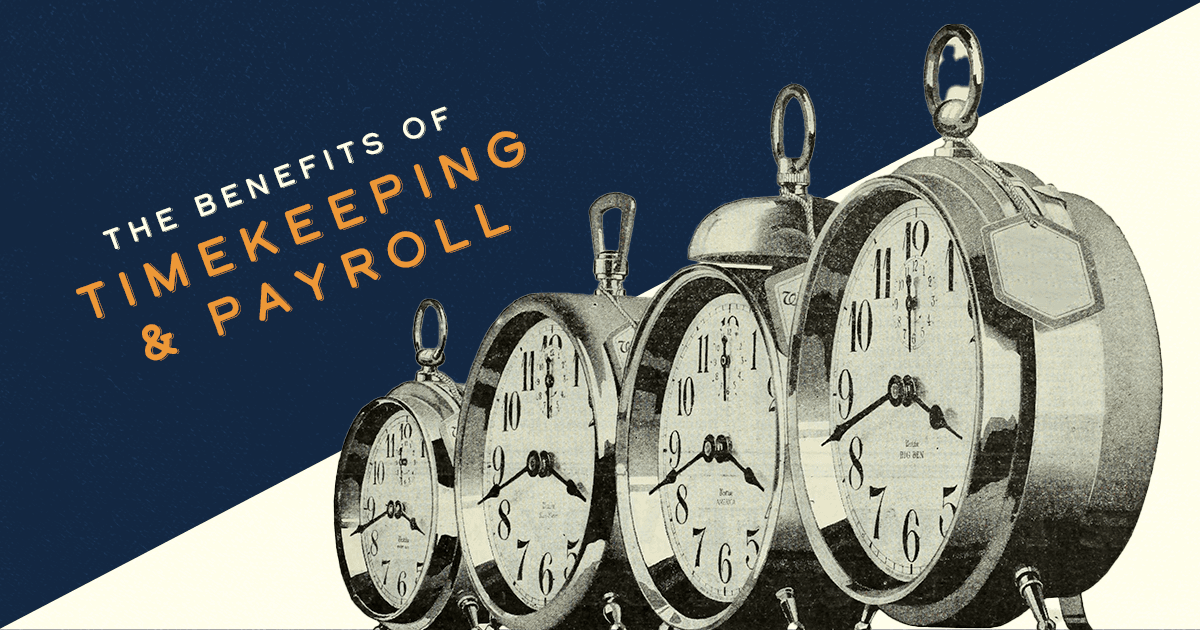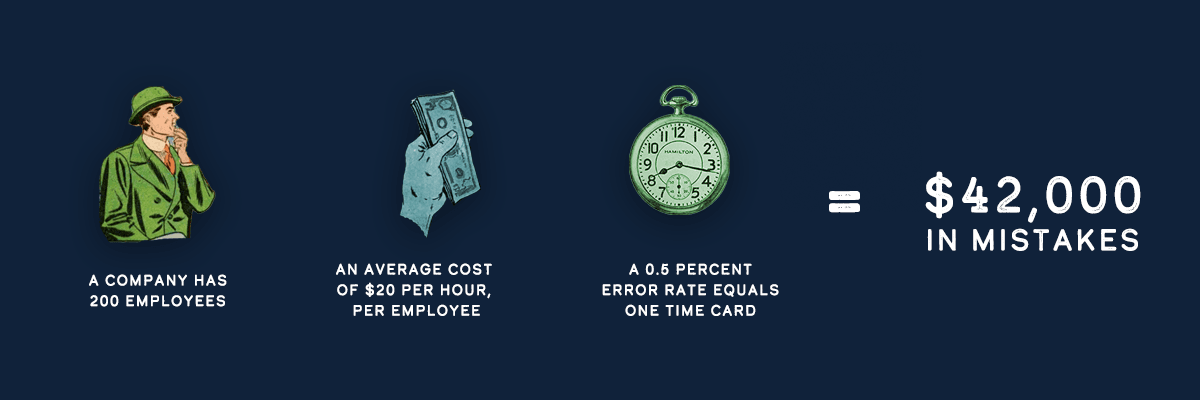
We all know the age-old saying, “Time is money.” If you have employees, this is absolutely true. Whether they are hourly or salary, their time spent on the job is what provides them with a paycheck (and you with an employee).
Errors in payroll processing are the enemy of employee engagement. When they occur, both the employee and the employer suffer, and broken trust lowers morale and threatens turnover.
So how do you ensure that your employees are being paid accurately on every single payroll run? The answer lies in implementing your timekeeping functionality with your payroll process.
Keeping track of time, so to speak, is an overwhelming task for any owner, manager, or HR leader. My coworkers and I always forgot to clock in after lunch at a previous job, which drove our supervisor crazy.
Fixing our time stole her valuable time as a manager in an incredibly hectic work environment.
What if she had an automated time system that automatically took out our lunch breaks? She would focus on her real passion as a gifted nurse and spend less time shut away in an office correcting missed punches from her staff.
However, integrating time and payroll may not always be the right fit for every business. If all of your employees are salaried, a timekeeping system isn't necessary. But if you have a workforce that you pay hourly, a time system can help you pay your team accurately while staying compliant and saving money.
If you are in a compliance-driven industry, like home health care, you may be required to use a state-specific timekeeping system for billing reimbursements.
This article will take a deep dive into what a timekeeping system looks like, and you’ll know if it's a feature you need for your business.
What is timekeeping?
Timekeeping is the process by which you track the number of hours, shifts, and job types your employee works which is contingent on how much they’re paid.
The benefits of integrating timekeeping
By tracking, managing, and processing time for your entire workforce in your HCM platform (whether they are remote, in the office, or on the go), you'll improve your payroll process and reduce stress for you and your team.
1. Manage Better
Timekeeping helps you manage your team better by storing employee data in one location. The hours they've worked, their schedules, shifts, and PTO requests are all available in one centralized system.
This integration also helps you collect time efficiently. Relying on spreadsheets and manual input creates room for human error. You can streamline this process and ensure accurate pay for your team by integrating a feature that:
- Offers multiple collection methods (virtual, physical, and mobile time clocks)
- Handles any work environment (remote, worksite, multiple locations, & more)
- Manages comp time (extra PTO in lieu of costly overtime pay)
- Builds shifts and schedules while setting up coverages and eligibility
- Enables job allocation by pay type, job code, or class of employee
Automated timekeeping benefits a business by relieving the pressure of not making payroll mistakes and facing disgruntled employees. It's a user-friendly experience for your team that empowers them to keep track of their schedules, shifts, and hours worked in the same system you need to process their payroll.
2. Save time and money
Get back to focusing on your role. Integrate software that alerts you before mistakes are made instead of spending late nights or long hours reviewing timesheets and double-checking your payroll process.
This eliminates errors that can cost you money, whether it's overpaying or underpaying. Time and scheduling allow you to reduce overtime, remove data entry errors, and eliminate buddy punching, i.e., employees asking other team members to clock in for them.
How much do you think it costs you to make a timekeeping mistake? Let's take a look at this example:

Minor errors seem insignificant, especially if you're stressed out, busy, or processing payroll last minute. An intuitive timekeeping integration will alert you to errors before processing, saving you money to invest back into your business and employees.
3. Stay compliant
Staying compliant goes hand in hand with saving time and money. When you eliminate human error, you will worry less about complying with labor laws and union regulations.
An automated timekeeping system helps prevent time theft when an employee clocks in but isn't working. This can look like fudging time cards, taking extended breaks, using their phones, or engaging in personal activities while at work.
The American Society of Employees estimates that 26% of every dollar earned by a US company is lost to employee time theft.
Because time theft is difficult to prove, a timekeeping feature with your payroll system prevents employees from clocking in too early, submitting time for a coworker, or punching in when they aren't actually in their proper job location (geofencing for the win!).
Determining Price
The last benefit of timekeeping is the pricing: it's short and sweet. Most payroll companies offer timekeeping as an additional service that you buy, and the price is as follows:
- What method of timekeeping are you using?
- Virtual, physical, or mobile
- How many employees do you have?
If you use a physical clock, you will have to buy or rent one from your new payroll provider. Otherwise, the virtual and mobile features are usually bundled with the timekeeping package and can be accessed virtually through a phone, iPad, or computer.
Most payroll companies charge you a PEPM fee (per employee per month) or a per payroll process fee. This means you will pay a flat fee for each one of your employees for timekeeping, or you will pay a flat fee every time you process payroll (weekly, biweekly, or semi-monthly).
To give you an idea of how this works, refer to how we price this feature at Whirks:

If you have 200 employees and choose to integrate this feature, you'll pay $2,210 (per month for payroll and timekeeping. That's $26,520 a year - but that's half the price of a potential $42,000 in errors (not including the possibility of time theft and buddy punching).
Time is on your side.
Integrating your time and payroll helps you manage your employees better, saves time and money, and streamlines your processes, ensuring that you stay compliant and reduce calculation errors.
Your employees won't be upset about a wrong amount on their paycheck, and you'll save time logging and processing time. Plus, you'll avoid potentially ugly compliance issues, such as time theft, buddy punching, and not paying overtime correctly.
Timekeeping is one room in the HCM house: it’s not necessary for you to have, but it lifts a burden so that you can focus on getting your business one step better every day.
At Whirks, we strive to help you get one step better every day. Download our infographic on time theft or book a demo to see the timekeeping feature in action.
Topics: